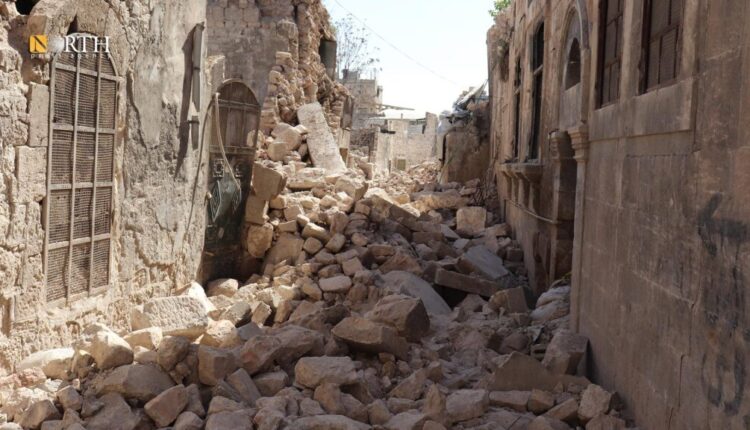
DAMASCUS, Syria (North Press) – The issue of restoring houses damaged by the February earthquakes has come to the surface again. Many houses need to be strengthened in order to withstand new potential tragedies.
The costs of restoring houses are very high, as partial repairing of a house costs millions. Many people are hiring unspecialized people who use bad-quality materials, which only creates more losses. Hence the threat of death surrounds these families.
Millions in costs
One of the engineers in the House Safety Inspection Committee told North Press that he was surprised by the high prices of the materials used for restoring and strengthening houses as they are mostly imported. Importing companies argue that these materials are expensive, making the cost of repairing any construction in millions of Syrian pounds (SYP).
The engineer noted, after touring the markets, that the price of a liter of binding agent can reach 55.000 SYP (equals $7.5), and a bag of repair mortar weighing 20kg can reach 165.000 SYP (equals $22).
The price of epoxy material used to install iron bars in concrete can reach 150.000 SYP (equals $20), which is enough for only 10-12 holes only.
The engineer said that the price of a liter of the adhesive material used to glue together old concrete roofs and new concrete could reach between 40 and 60 thousand SYP (equals $5-8 ) based on density.
The price of the material needed for isolating iron to withstand rust can cost 220-250 thousand SYP(equals $30-34 ) each meter. All these are exorbitant prices that make the affected people suffer more.
Cost reduction
A member of the Syria Code Committee suggested that the government take measures to reduce the prices of needed materials, which are crucial for effective restoration since the majority of those who do repair work currently are quake-affected people and facing financial difficulties.
The expert recommended that the customs fees of these materials are reduced inorder to reduce the prices for customers. He also proposed that businessmen reduce their profits to help the people affected by the quake.
At dawn on February 6, a 7.8 magnitude earthquake hit Syria and Turkey, killing thousands and injuring many more. The earthquake also caused immense destruction of buildings, trapping thousands under the rubble.
A thousand houses
So far, there has been no final statistic of damaged houses. The provisional count indicates that damaged houses in the Syrian coast are many because of the effect of humidity on concrete and steel, and the illegal construction.
A former head of the municipality in the coastal city of Jableh noted that the building could stand on the basic structure for long years before completing construction.
When a contractor intends to resume a project in an area known for humidity, such as the Syrian coast, he continues construction without conducting any tests on the already built section of the building.
The source told North Press that the earthquake has revealed all these flaws. Even though the quake epicenter was not in Syria, casualties were many.
In the Governorate of Tartus alone, “more than a thousand houses need restoration.” Even the cities that are far from the quake’s epicenter, such as Jableh, were drastically affected.
The reason behind this is that the affected buildings were not constructed according to the required standard for construction, especially by the private sector that used to mock the idea of constructing buildings according to the seismic map, constructing earthquake-resistant buildings, or at least according to good specifications.
Unchecked population
One of the affected people in Jableh told North Press that the authorities told him to evacuate or restore his house. He said he cannot do either even if an earthquake strikes tomorrow. “The costs of repairing or renting a house are too high, which I cannot afford.”
Hayder Muhammad, one of the affected people in Jableh, said, “The government left the population unchecked and is not interested in discussing how to deal with the destruction left behind by the earthquake.”
He added, “Many officials in Syria rejoice in irregularities and do not deter them from happening as they make a fortune of bribes.”
Taking advantage of the crisis
Muhammad also described the work of businessmen as exploitative. He noted that they take advantage in any crisis to make more profits. The affected families are left alone to face hardships.
He suggested that importing and trade companies should settle for fewer profits for at least a year or to pay their taxes without evasion for a year.
He believes this will not affect their luxury but rather reduce the prices of restoration materials by at least 20 percent.
